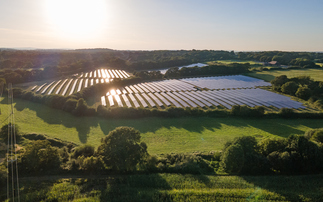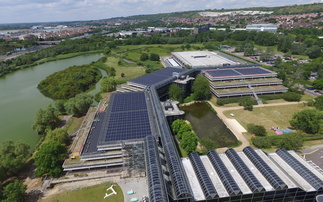Lawyers reject government's claim that controversial cuts to solar subsidies saved households £50 a year
Lawyers involved in the controversial legal challenge relating to the government's unlawful handling of solar subsidy cuts back in 2011 have slammed the Department of Energy and Climate Change (DECC) for using "inflated and inaccurate" figures to continue to justify its opposition to compensation claims launched by a number of solar installers.
A group of 14 solar companies secured a significant victory this week in their pursuit of up to £132m in compensation relating to contracts that were lost as a result of the government's decision to rush through cuts to feed-in tariff incentives in breach of its own consultation rules. The High Court ruled on Wednesday that the companies were entitled to compensation, paving the way for a separate ruling on how much they should receive.
However, the government immediately signalled it would appeal against the ruling from Mr Justice Coulson and issued a statement arguing that the original decision to rush through cuts to feed-in tariff incentives was justified by the need to protect households from the rising bills that would have resulted from a boom in solar installations.
"We believed we were proposing lawful changes to subsidies, which would protect consumers from rising bills at a time when windfall profits meant the industry was booming," DECC said. "Solar is a huge success in the UK, worth £2.2bn a year, thanks to government support, and the tariff changes that protected consumers from a £50-a-year bill rise by 2020 haven't changed that success."
However, Prospect Law, the firm leading the legal action against the government, today accused the government of drastically over-stating the impact of the 2011 cuts to solar subsidies on bills, arguing that the government's own impact assessment revealed the true saving that would have resulted from rushing through the changes to feed-in tariffs was £1 per household.
"It is disappointing to see DECC stating that this case is about a £50 saving to customer bills when, on their own figures, the difference was actually £1," said a spokesperson for Prospect Law. "DECC undertook an unlawful action back in 2011, and this was confirmed by the High Court, the Court of Appeal and the Supreme Court. DECC's unlawful action caused serious damage to the solar industry and it is only right that solar firms be compensated for the damage which they suffered so they can get back to their work in an important sector."
They added that DECC's decision to mischaracterise the case "by providing inflated and inaccurate figures does little to restore the confidence of an industry that must work closely with government if this sector is going to continue to grow".
The row centres on the decision by the government in late 2011 to impose cuts to feed-in tariffs from that December, despite the consultation on the proposed changes only closing that month. The government's impact assessment looked at the cost to households of leaving feed-in tariffs as they were, cutting them as of December 12 - an approach that was later deemed unlawful - or cutting them on April 1 2012, as had been originally expected by much of the solar industry.
The impact assessment concluded that the impact on average household bills in 2010 prices was £3.20 if the cuts were rushed through in December and £4.20 if the changes were delayed until the following April. "By DECC's own analysis the difference between a 12 December 2011 cut and a 1 April 2012 cut was £1," Prospect Law said in an emailed statement. "Adjusting for inflation (at 3.5 per cent per annum) to give a 2020 price the cost goes up to £1.41. This is, clearly, nowhere near the £50 quoted by DECC in their 9 July statement."
DECC responded by insisting the £50 figure was justified on the grounds that its modelling showed that a "do nothing" scenario would have resulted in bills being at least £50 higher in 2020 compared to the impact of an early December cut to feed-in tariffs. "This figure is far from inflated," a spokeswoman said. "The £50 saving on consumer bills as a result of the changes to the scheme is based on calculations which deduct the expected impact on consumer bills under the reformed feed-in tariff scheme of £9, from an estimated £61 impact if no intervention had been taken until 2020."
The response is likely to further anger solar firms, many of which have argued that they accepted the need to cut feed-in tariff incentives in April 2012 and were simply opposed to the government's decision to try and rush through the changes to the scheme with such little notice.
One industry source said the government had sourced the £50 estimate from the Comprehensive Review of the Feed-in Tariff undertaken in 2011, which covers changes to the scheme that extend beyond the cuts to solar installations with less than 50kW of capacity that were at the centre of the legal action.
They also argued that in comparing the savings that resulted from the changes with the "do nothing" scenario the government was again misrepresenting the solar firms' position. "Given the developments in the market by April 2011 nobody was suggesting that no action be taken," they said. "The solar campaign at the time was called "Cut don't KILL" not "Leave it entirely alone". The industry understood the need for a review and for cuts - it just wanted them to be done in a lawful way."
"The £50 figure DECC have given not only includes modification to the scheme outside of the scope of this case - but also compares what they have supposed to achieved with a theoretical scenario that was never going to happen," they added. "They are clearly misrepresenting the case to justify their proven-unlawful action long after the fact."
The latest row further underlines the tensions between the government and parts of the solar industry.
Ministers have repeatedly argued that the original cuts to feed-in tariffs were necessary to ease upward pressure on energy bills and have insisted that the changes, while proving controversial at the time, have helped put the industry on a more sustainable footing. Ministers have also pointed to how subsequent reductions in the cost of solar technologies have resulted in a rapid expansion in the number of solar installations, despite a series of cuts to feed-in tariff incentives.
But a number of solar firms have argued that the unlawful nature of the original changes to solar subsidies means they are entitled to compensation for the contracts that were cancelled as a result of the changes.
Speaking earlier this week, Nick Keighley of Solarlec, said that while the industry had bounced back in recent years the government's mishandling of the initial feed-in tariff cuts had done huge damage to the industry and dealt a major blow to its development. "The feed-in tariff is now stable and the costs of solar PV are slowly reducing, representing increasingly better value for consumers and a very cost-effective way of generating green energy," he said.
"The fact is, however, that the industry was treated very badly by DECC, and their actions in 2011 damaged the growing industry and severely harmed the ability of companies such as ours in a key growth sector from investing, innovating and creating much-needed jobs as well as contributing to UK carbon-reduction commitments."
And, according to Prospect Law, the damage wreaked on the industry was the result of a desire to try and save households £1, not £50, a year.









